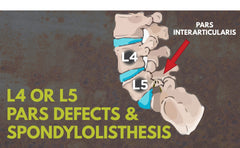Cervical Spondylolisthesis Symptoms, Causes, & Treatments

What Causes Cervical Spondylolisthesis?
The causes of cervical spondylolisthesis are quite similar to those of other lumbar problems. Spondylolisthesis cervical spine is often brought on by degenerative changes in the spine over time, such as disc degeneration, bone spurs, & herniated discs. Arthritis of the spine, or cervical spondylolysis, is a relatively common phenomenon among the elderly. Other things that can pressure the vertebra, causing it to slide include a tumor or osteoporosis.
Like lumbar spondylolisthesis, spondylolisthesis in the neck can also be brought on by a defect of the bones in the neck as a result of hyperextension trauma. This fracture to the bony ring is known as cervical spondylolysis.
Some believe that congenital types of cervical spondylolisthesis exist that can make one more prone to cervical spine spondylolisthesis.
The severity of your cervical spondylolisthesis is measured by the degree of slippage of our vertebrae. There are five different grades of spondylolisthesis, grade I being least severe, and grade V being most severe.
What Makes Me More Prone to Cervical Spondylolisthesis?
Although the natural aging process is the most likely the cause of your spondylolisthesis of the neck, there are other factors that make you more prone to developing this condition. These include:- Injuries to the neck
- Genetic factors
- Smoking
- Straining your neck or holding it in the wrong position for long period of time
- Being an overweight or plus size individual
Cervical Spondylolisthesis Symptoms
Spondylolisthesis of the cervical spine can cause pain in the neck. If the sliding vertebra pressures the spinal cord or nerves, it can also cause radiating pain, weakness, numbness, and tingling in the shoulders, arms or hands. Other symptoms include:- Pain around your shoulder blade region
- Pain that increases when you stand, sit, twist, or move your neck backward
- Headaches in the back of your neck
- Difficulty grabbing or holding on to objects
- Balance
- Bowel or bladder function
- Hand usage
Cervical Spondylolisthesis Treatment
The first line of defense is to modify your activities so as to eliminate harmful movements. A cervical spondylolisthesis brace can be helpful to this end. Physical therapy can also be helpful for teaching the body to move in less harmful ways.
A brace and over-the-counter anti-inflammatory pain medications can help with pain management. You can apply hot or cold packs to your neck region to help alleviate your symptoms. In severe cases, an epidural injection may help bring relief.
As is the case for lumbar spondylolisthesis, treatment typically includes cervical spondylolisthesis exercises and stretches to strengthen the muscles of the neck to reduce pressure on the spine and maintain or improve its range of motion.
If these conservative modes of treatment fail to bring relief, you may have to resort to surgery. This is typically not your first choice due to the risks of permanent nerve or spinal cord damage. Most procedures do have high success rates, however.
Surgical treatment usually involves one or both of the following:
- Lamino-foraminotomy to decompress the spine
- Fusion to stabilize the spine




